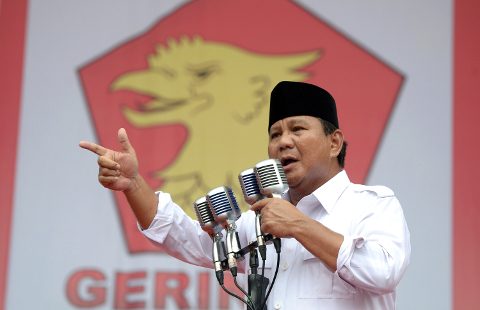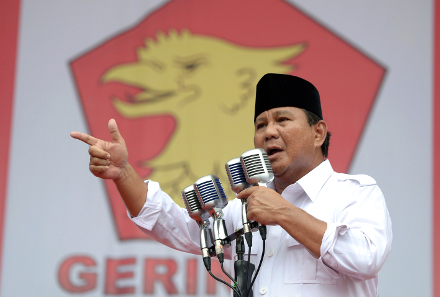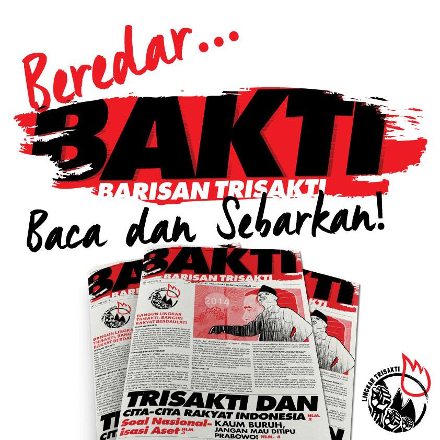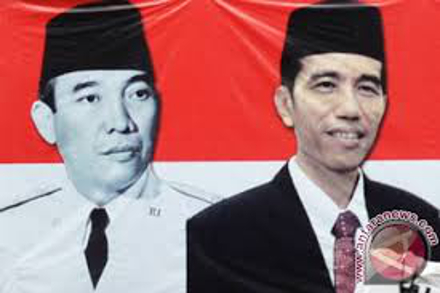John Roosa explains how both Prabowo and Jokowi are advertising themselves as the legatees of Indonesia’s first President, Sukarno.
……………
Which Sukarno imitator would you prefer? The fellow wearing the black fez, just like the one Sukarno wore, or the fellow professing Sukarno’s slogans?
This is the choice facing Indonesia’s voters in the July 9 presidential election. The race between Prabowo Subianto and Joko Widodo (Jokowi) pits one version of Sukarno against another version. Both candidates advertise themselves as the authentic legatees of the country’s first president. Why are they appropriating the symbols and words of a long-dead president? Suharto, the army general who deposed Sukarno, spent his 32 years in power discrediting him as a relic of the “Old Order.” Why is his ghost still hovering around Indonesian politics?
Prabowo, the former lieutenant general and black ops specialist, likes the visual associations: his microphones are of a 1950s design like those Sukarno was photographed with; his white jacket is like the one Sukarno wore; the backdrops behind his photo-ops contain Sukarno portraits. His campaign managers claimed the large house they are using as their headquarters, Rumah Polonia, was once occupied by Sukarno. In fact, it was occupied by one of his wives, Yurike Sanger, and Sukarno only dropped in for the occasional conjugal visit.
The tempo doeloe (old times) style of the campaign launch at Sanger’s former house went to the head of Amien Rais, a leader of an allied political party, who took the microphone to improbably suggest that Prabowo’s heavy-set, droopy-cheeked face resembled Sukarno’s. Rais was like a drunken father of the bride at a wedding party as he watched his protégé, Hatta Rajasa, a faceless political operative, step forward as Prabowo’s running mate. Hatta was chosen because he knows more about the secrets of the ruling oligarchs than just about anyone else: he has been a cabinet minister for the last 13 years and Coordinating Minister of Economic Affairs for the last four. That his name is the same as Sukarno’s co-proclaimer of independence is just serendipitous. Prabowo’s campaign managers hoped to take advantage of the coincidence by using the building where Sukarno and Hatta wrote the declaration of independence in 1945 as the site of the campaign launch. They were disappointed to learn that it is a protected landmark.
Prabowo’s invocation of Sukarno’s spirit seems bizarre given that he is the ideological child of Suharto’s New Order and the biological child of a famous enemy of Sukarno’s. His father, a Dutch-educated economist, Sumitro Djojohadikusumo, collaborated with the CIA to sabotage Sukarno’s government and establish a parallel government in Sumatra in the late 1950s. The attempt failed and Sumitro was labeled a traitor. Prabowo (born 1951) partly grew up outside the country in places such as Singapore and Kuala Lumpur where his family lived in exile. Sumitro only returned in 1968, after Sukarno had been driven out of power and kept under house arrest (at the house of his Japanese wife, Ratna Sari Dewi). Back in Jakarta, Sumitro became the Minister of Trade and a father figure to the US-trained economists of the so-called “Berkeley mafia” who were helping engineer the New Order’s great natural resource sell-off. Prabowo’s family owes its fortune to the Suharto regime.
What Prabowo sees in Sukarno is the image of a powerful, charismatic leader. He admires the Sukarno who emasculated the political parties and ruled by decree during the Guided Democracy years (1959-66). Prabowo has said that he would like to create a new version of Guided Democracy. His political philosophy from the 1990s, when he started speaking to journalists, to the present consists of essentially a single point: Indonesia needs a strong leader. His speeches and his party’s literature revolve around this point. Gerindra, like its emblem of the Garuda (the bird on which Lord Vishnu rode), is just a vehicle; it is designed to ferry its god to the presidential palace, an earthly paradise for worshippers of state power. Prabowo and his billionaire brother created the political party so that he could run for president. He has had no patience for the day-to-day wrangling of law-making and the rule of law: he has not served as a member of parliament. He has no experience with government, only with the military, business, and the business of the military (as an international arms trader). His entire political career has been an exercise in personal aggrandisement.
Gerindra’s manifesto characterises the post-Suharto political system as “liberal democracy” that is not in accordance with the “national culture.” Electoral democracy is decentered and dissolute; it has made the body politic flaccid, preventing a “strong national leadership” from standing erect. In Prabowo’s mind, everything about a country – the quality of its economic system, culture, and international standing – depends on the “leadership factor.” The solution for all of Indonesia’s ills is a “strong national leadership,” meaning himself, the great one riding the $300,000 Lusitano horse.
Prabowo’s version of the F├╝hrerprinzip cannot be equated to Sukarno’s without anachronism. Sukarno built a cult around his leadership at a time when the nation was in an existential crisis: the Constitutional Assembly was deadlocked on the basic principle of the state, with the Islamic political parties insisting on an Islam as the basic principle; army colonels in the outer islands had set up a rival government with help from Prabowo’s father and the Dulles brothers; armed partisans of an Islamic state terrorized West Java, even in areas close to the capital; the country was under martial law; cabinets had trouble lasting for more than a few months. And so on. Sukarno, as a product of the mass struggle for independence, presented himself as the “tongue” of the people, their voice, not their backbone or élan vital. His July 5, 1959 Dekrit was a last resort, an unwanted outcome. This authoritarian polity was not what he had worked towards since becoming a political leader in the 1920s, even as he put the best face on it.
Prabowo is condemning “liberal democracy” at a time when the Indonesian state is not facing an emergency, when much can be done to expand the rule of law and democratic rights. His ideas have not changed since he was part of Suharto’s praetorian guard. A journalist interviewed him in 1997: “He quotes academic studies that claim that a viable democracy can only be maintained after a society reaches a per capita GNP of around $2,000 (Indonesia is at $940). In the meantime, he says, there must be stability to achieve a basic economic level of welfare.” One knows it’s a fool’s game when the goalposts keep moving: Indonesia’s GDP per capita today is about $3,500 but supposedly it is still not enough to have a “liberal democracy.”
Prabowo fills his speeches with the populist, anti-imperialist rhetoric that has been the stock-in-trade of the Sukarnoist political tradition. He condemns the privatization of state-owned companies, deregulation pushed by the IMF, and the money politics behind Indonesian elections. According to him, foreign corporations, neoliberal policy wonks, and kleptocrats conspire to exploit the sweated labor of Indonesian peasants and workers. It is hard to take the rhetoric seriously coming from a wealthy capitalist who has been negligent in paying his own workers. Gerindra would not exist without the infusions of money from his brother, Hashim, the 32nd richest man in Indonesia according to Forbes. (If Prabowo becomes president one can be sure Hashim will quickly rise in the rankings.) Prabowo’s opportunistic use of the Sukarnoist rhetoric has occasionally landed him in trouble. Because of his promises to reassert state ownership over unnamed foreign-owned businesses, Hashim had to issue a press release to assure spooked investors that his brother has no plans to repeat Sukarno’s nationalization policies.
For the sake of historical accuracy, he should build his campaign around Suharto nostalgia. Prabowo wants to return the country to some form of the pre-engineered electoral system and unaccountable presidency of Suharto’s time. The problem he faces is that Suharto lacked one thing that he needs to win elections: the image of a virile, charismatic public speaker forcefully denouncing enemies and rallying “the masses.” Suharto’s public image – the quiet, reserved, non-ideological administrator – was designed to be the antithesis of Sukarno’s. Prabowo is designing a new mutant creature, transplanting the wild, romantic heart of Sukarno into the stiff, rotting corpse of Suhartoism.
If Prabowo invokes Sukarno to legitimate his retrograde, personalistic politics, Jokowi invokes Sukarno to legitimate a polar opposite political agenda. Jokowi, the choice of Sukarno’s biological daughter, Megawati (whose mother is another wife, Fatmawati), to be her party’s presidential candidate, represents a clear break with the existing politics of rent-seeking. As mayor of Solo (2005-12) and governor of Jakarta (2012-14), he cracked down on the civil servants’ bribe-taking and embezzling, thereby freeing up money to be spent on public goods. The progress in just two years in dealing with Jakarta’s problems, such as flooding, traffic congestion, lack of green space, and poor public health, has been impressive, especially when compared with the passivity of previous governors. Jokowi repeatedly states that the government has enough revenue to finance social welfare projects, as long as the revenue is not diverted into private pockets. He has shown what can be done when civil servants are serving the public.
Jokowi, unlike Sukarno and Prabowo, is not given to grandstanding. His speeches, effective and straightforward, have no flair. For his campaign slogan, he has borrowed Sukarno’s formula of Trisakti – the three sakti-s. Sakti connotes a kind of sacred or magical power. In a 1963 speech, Sukarno called for Indonesia to be “standing on its own feet” in its politics, economics and culture. At the time, Sukarno was defending the peculiarities of Guided Democracy. Jokowi has no desire to return to that form of authoritarianism. His interpretation of Trisakti is generic, abstracted from the original context. For Jokowi, who claimed Trisakti to be his guiding principle as early as 2012, it has practical import. It means, for instance, in economic terms, a greater emphasis on domestic production for domestic consumption, a reduction in the massive importation of things such as rice and sugar that can be easily produced in Indonesia. It means deriving greater revenue from the mines and oil wells that have so far enriched foreign corporations and a small group of local oligarchs, such as Aburizal Bakrie, the head of Golkar who has joined forces with Prabowo.
Jokowi’s commitment to the rule of law means that he is trying to overcome the entrenched legacy of both Sukarno’s Guided Democracy and Suharto’s New Order. Unlike every other presidential candidate since the first post-Suharto democratic election in 1999, he is seriously proposing to improve what social scientists call state capacity – its ability to collect taxes and spend that tax money on public goods – instead of just reshuffling the same set of rent-seekers. Prabowo has reportedly pledged a certain number of ministries to two of the parties supporting him (Golkar and PKS). That is the usual practice: the parties of the winning coalition receive ministerial posts as rewards. It is a sublime experience for them, sometimes prompting tears. They then proceed to mercilessly squeeze all the money they can out from their departments. With Jokowi, there is a chance that things will turn out differently. He has stated that he will not reward his allied parties with ministries.
Jokowi’s “vision and mission” statement is a detailed 42-page document, quite distinct from Prabowo’s 9-page, insubstantial, hastily written statement. While it contains some boilerplate prose, it also contains concrete proposals and carefully considered ideas. In elaborating the meaning of Trisakti, Jokowi’s statement lists nine priorities for his administration. Implicitly alluding to Sukarno’s Nine Points speech of June 1966 (Nawaksara), in which Sukarno defended his record against accusations from the newly triumphant Suharto, Jokowi names the priorities the Nine Ideals (Nawacita). One ideal is to “uphold human rights and reach just resolutions for past cases of human rights violations.” Jokowi specifically mentions the “1965 Tragedy” and the case for which Prabowo was responsible: the disappearance of political activists in 1998 (p. 27).
When it comes to imitating Sukarno, Jokowi is as much an imposter as Prabowo. It could not be otherwise. Sukarno was a protean and unique figure. Jokowi adopts the left-wing populism of Sukarno while (thankfully) repudiating the authoritarian tendencies. Prabowo adopts the authoritarian tendencies while insincerely mouthing the rhetoric of left-wing populism. One champions the rule of law. The other champions himself as Il Duce. That both of them are emphasizing their allegiance to Sukarno indicates the enduring hold he has over the public’s imagination of state power.
Sukarno tried to embody the entire nation in himself and believed in the impossible idea that he could singlehandedly bind all the disparate groups together. Every year on independence day, he stepped behind a bank of microphones to deliver a lengthy speech that explained where the nation had come from, where it was, and where it was going. It was nothing like a US president’s “state of the union” address. It was about the meaning of the nation’s existence. The speech was broadcast over the state radio stations and many Indonesians reverently listened at the same time in sonic communion. He once said his monologue over the airwaves was really “a two-way conversation between Sukarno-the-man and Sukarno-the-People.”
In The King’s Two Bodies (1957), Ernst Kantorowicz wrote of the medieval kings of Europe having both a mortal body and an eternal body. As the embodiment of the entire state, the king’s body was also the “body politic.” It was a conception of royal power that can only be grasped by considering some political ideas as simultaneously theological ideas. The Indonesian state, like all other states today, carries its own theology, involving itself in ideas of immortality, the sacred, and the sublime. We have not transcended the medieval state in this respect, only sublimated it in different forms. As Benedict Anderson has argued, nationalism is better understood as a religion than an ideology.
Sukarno, given his central role in formulating the permanent state ideology (Pancasila), proclaiming independence, an irreversible event of eternal significance (sekali merdeka, tetap merdeka; once independent, forever independent), and ruling as its first president (appointed at one point as “president for life”), seems destined to reign as the immortal corpus mysticum of Indonesia’s body politic.
Sukarno is dead. Long live Sukarno.
……………
Professor John Roosa is a historian at the University of British Columbia in Vancouver, Canada.
 Facebook
Facebook  Twitter
Twitter  Soundcloud
Soundcloud  Youtube
Youtube  Rss
Rss 


